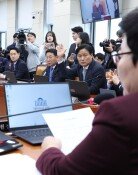[Editorial] Testing Koreas Resolve
[Editorial] Testing Koreas Resolve
Posted April. 15, 2006 03:08,
Japanese unilateral diplomacy is getting serious. The Japanese government has recently submitted its plan to the International Hydrographic Organization for the Japan Coast Guard to probe the seabed of the Korean side of the Exclusive Economic Zone in the East Sea. This is a clear violation of international maritime rules under which a country should seek permission from the concerned nation if it attempts to conduct scientific research and probe in a foreign countrys EEZ. Japan seems to make up an excuse to put the issue of Dokdo to international dispute and ultimately take it to the International Court of Justice.
A Japanese ambassador to Korea Shotaro Oshima answered, Waters that Japan will explore belong to the Japanese part of EEZ at the Korean governments request for withdrawal of the probe plan yesterday. He reiterated the countrys stance that fixes the boundary of EEZ between Ulleungdo and the islet of Dokdo. Last month, its Ministry of Education, Culture, Sports, Science and Technology asked publishers of high school textbooks to state Takeshima, Dokdo in Japanese, as the countrys territory in the books. All of these developments indicate that Japan is becoming bolder in laying claim to Dokdo.
At this juncture, the Korean government should take a calm and firm response. In the case of an unauthorized exploration attempt by Japan, Korea should take legitimate reactions such as stopping or seizing Japanese boats in accordance with international laws. Far from pouring ineffective condemnation, the government should make continuous and exhaustive efforts to convince the international community of Koreas position on this issue.
The government should also do some soul searching on whether it encouraged Japans ever worsening unilateral diplomacy. It gave into a compromise with Japan to place Dokdo in the middle of both countries waters in the second round of the Korea-Japan Fisheries Agreement in 1998. It also left room for territorial dispute by citing Ulleungdo instead of Dokdo as a starting point to fix EEZ boundaries with Japan. Especially around the second round of bilateral fisheries talks, suspicions had it that the negotiations were sped up for the government to set the tone for former President Kim Dae-jungs winning of the Novel Peace Prize.
Myopic diplomacy that only serves domestic politics left the country with its grave consequences. This also holds true now and for the future.



![납중독 사망 50대, 원인은 ‘낡은 보온병에 담은 커피’[알쓸톡]](https://dimg.donga.com/c/138/175/90/1/wps/NEWS/IMAGE/2026/01/19/133182417.3.jpg)



